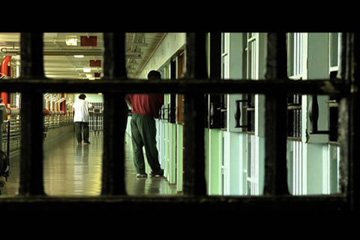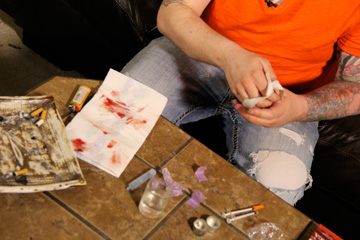Next story: Recycling the Numbers
The Odessa File
by Jordan Canahai

Buffalo based Television/Film Producer Working on Independent Documentaries about Prison Riots, Heroin Addiction
For nearly 20 years Buffalo native Stephen Powell has been proving himself to be one of the most dynamic and prolific of filmmakers to emerge from the Queen City. In recent years he has drawn upon his wide range of experiences to produce independent documentaries, a unique area he’s long been passionate about. Through his production company Odessa Pictures, which he co-founded with his longtime friend and business partner Suzi McGowan in 2003, he’s currently producing two documentaries tackling difficult subject matter of social relevance; prison riots in the United States and the damaged lives of those struggling with heroin addiction.




His documentary about prison riots takes a hard-edged look at the causes and effects of prison riots in the United States. It will feature expert opinions from a wide variety of policy-makers, prison officials, and activists, as well as first-hand accounts of those who’ve witnessed and survived prison riots. Also incorporated throughout Powell’s documentary is actual security footage captured during the riots. In one of the more harrowing moments from the documentary, a prison guard recounts his experience of being held hostage during a riot. When the prisoners refused to stand down, law enforcement officials opened fire on the inmates, killing not only the guard’s captors but critically wounding him as well. Such moments of state-sanctioned violence against their own employees are common during riots.
Stage one funding for Powell’s documentary was provided indirectly by New York State as part of a project for a prisoner’s rights organization. “A lot of New York politicians, Democrat and Republican, are realizing the importance of communicating with inmates. No matter where one falls on the political spectrum, the living conditions and well-being of prisoners must be addressed,” explains Powell. “Without improved dialogue between New York State and the incarcerated, we run the risk of seeing the problems of prison violence and riots continue to increase.”
Powell hopes to gain access to more prisons throughout the country to further document the widespread problem of prison riots. “It’s been difficult getting inside these prisons for filming. So far we have shot footage inside Attica Prison, a Supermax, with cooperation and permission of the superintendent as well as the Acting Commissioner of the New York State Department of Corrections and Community Supervision. We are also hoping to gain access to Riker’s Island for filming.” Other locations Powell hopes to possibly film at in the future include Sing Sing Correctional Facility in New York, as well as prisons in New Hampshire and Texas.
Powell is also producing a documentary about heroin addiction in the United States and the terrible toll it takes on the lives of those struggling with it. The subject has been a personal one for Powell for many years. “Honestly, it scares the hell out of me. When I was younger I knew three musicians, including a close friend, who moved to New York City to pursue rock and roll, only to start using heroin. I went down to visit once before I knew she was using only to find her flopped out on her bed with her boyfriend, a needle in her arm and blood stains along the mattress. Thankfully she’s been sober for 11 years now and is happy and beautiful.”
Unfortunately, many more that become addicted to the drug are not so lucky. Despite widespread beliefs that heroin addiction is something that largely affects the poor in urban environments, Powell has been most surprised, and frightened, by not just the growing number of people getting addicted in recent years, but the wide variety of backgrounds they fall into.
“This story has changed. Who’s getting addicted and how they’re getting addicted is different. We’re getting suburban kids doing heroin more than ever before. I’ve got middle-class teenagers; honor students, star athletes, and cheerleaders coming forward about their experiences shooting up and getting hooked.” A heartbreaking scene from the documentary features one of its local subjects, a pretty girl in her late teens, recount her first experience with the drug at the age of 14. While she shoots up before the camera she tearfully breaks down at how powerless she’s felt when faced with her addiction since then.
Powell hopes to have more people who’ve struggled with heroin addiction come forward so he can tell their stories. “I’ve spent up to two months in some cases getting to know these people and gaining their trust and assuring them my intentions are good before they’ve felt comfortable enough to allow me to film them, usually it’s just the two of us and my camera in their homes.” He also hopes that, despite the misery of addiction, his documentary can also feature voices of those who’ve been able to stay sober, thus offering a glimmer of hope to those struggling to do the same.
Powell has earned screen credits as a director, story editor, producer, field producer, director of photography, camera operator, and editor on a wide variety of projects including programs for A&E, National Geographic, CBS, The History Channel, PBS, Bravo, Court TV, Animal Planet, ABC, and Discovery-Channel Canada, along with numerous commercial productions. Some of his credits include working behind the scenes for Dr. Phil, Rachel Ray, and the 2010 Winter Olympics in Vancouver. His many documentary credits, both those he’s generated himself and those he’s worked on, include serving as editor and story editor, alongside McGowan as editing supervisor, on 2006’s award winning The Forgotten City, a clear-eyed look at life in the inner city.
Powell also teaches filmmaking at the Park School of Buffalo. “I use this opportunity to bring my real world television production and documentary experience to the kids there. It is a great opportunity to help influence the next-generation of filmmakers.” Powell cites Odessa Pictures co-founder Suzi McGowan as his most valued collaborator. “As my good friend and business partner of 16 years, Suzi is very involved in all the work we do. She holds our work to the highest standards and I couldn’t do it without her.”
While thankful for the opportunities he’s had working for network television and proud of the quality of his work in that field, Powell’s great ambition is to continue pursuing a career as an independent filmmaker with the same success. “The TV Network stuff pays the bills and gave me a lot of great experience, but I don’t want to be under the control of network producers. I want to be able to tell the stories I want to tell, and the only way to do that is to work independently.” As such, Powell has little interest in pitching his finished films to various networks for airing, where they would be subject to the choices of executives, but rather is looking forward to taking them on the film festival circuit and gaining widespread distribution from there.
A life-long resident of Western New York, Powell has a storied history of activism and community organizing. His commitment to social justice is reflected in many of his documentary projects, while others explore facets of life in his hometown that may otherwise go unnoticed. Powell hopes that by telling emotionally gripping human stories that are also relevant to major social and political issues, his documentaries can not only function as a means of allowing a wide audience to empathize with the struggles of individuals, but also raise awareness of the problems they address and influence policy-makers to bring about larger social change.
“I made the decision to work independently on documentaries a few years ago out of a life passion. The nice thing about working for networks, despite the lack of creative control one has, is that they drop big money on the table quickly for their projects. Although acquiring funding for independent productions is a longer, slower process, the end results are deeply gratifying. In telling these stories I feel like I’ve really contributed something to humanity.”
For more information on Stephen Powell, Suzi McGowan, and Odessa Pictures visit www.odessapictures.com.
blog comments powered by Disqus
|
Issue Navigation> Issue Index > v14n12 (Week of Thursday, March 26) > The Odessa File This Week's Issue • Artvoice Daily • Artvoice TV • Events Calendar • Classifieds |









 Current Issue
Current Issue